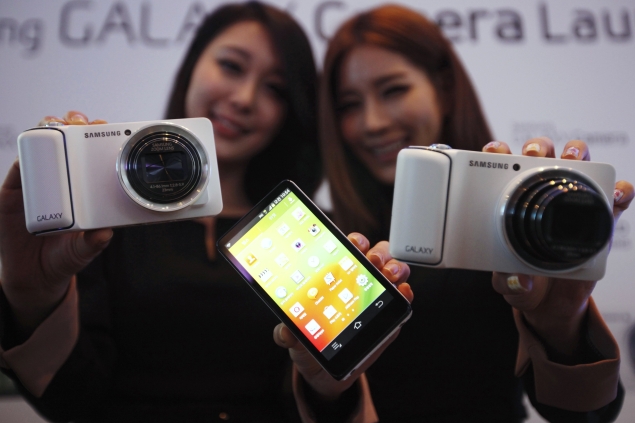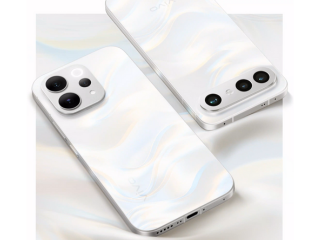- Home
- Cameras
- Cameras News
- Samsung launches Galaxy camera in Japan
Samsung launches Galaxy camera in Japan

The Galaxy camera lets users connect to a mobile network or Wi-Fi to share photographs and video without having to hook up the camera to a computer.
While it's not the first to the market, Samsung's financial and marketing clout suggest it could be the biggest threat to Japanese domination of a digital camera industry which research firm Lucintel sees growing to $46 billion by 2017 and where big brands include Canon Inc, Sony Corp, Panasonic Corp, Nikon Corp and Olympus Corp.
"Samsung has a tough row to hoe against the likes of Canon and Nikon in the camera brand equity landscape," said Liz Cutting, senior imaging analyst at research firm NPD Group. "Yet as a brand known more in the connected electronic device arena, Samsung has a unique opportunity to transfer strength from adjacent categories into the dedicated camera world."
The Korean group, battling for mobile gadget supremacy against Apple Inc, is already a global market leader in televisions, smartphones and memory chips.
Samsung last year brought its camera and digital imaging business - one of its smallest - under the supervision of JK Shin, who heads a mobile business that generated 70 percent of Samsung's $7.4 billion third-quarter profit.
"Our camera business is quickly evolving and I think it will be able to set a new landmark for Samsung," Shin said on Thursday at a launch event in Seoul. "The product will open a new chapter in communications - visual communications," he said, noting good reviews for the Samsung Galaxy camera which went on sale in Europe and the United States earlier this month.
Aiming at pro-sumers
The Galaxy camera, which sells in the United States for $499.99 through AT&T with various monthly data plans, features a 4.8-inch (12.2 cm) LCD touchscreen and a 21x optical zoom lens. Users can send photos instantly to other mobile devices via a 4G network, access the Internet, email and social network sites, edit photos and play games.
The easy-to-use camera, and the quality of the pictures, is aimed at mid-market 'pro-sumers' - not quite professional photographers but those who don't mind paying a premium for user options not yet unavailable on a smartphone - such as an optical, rather than digital, zoom, better flash, and image stabilisation.
The appeal of high picture quality cameras with wireless connection has grown as social media services such as Facebook Inc drive a boom in rapid shoot-and-share photos.
"At a price point higher than some entry-level interchangeable-lens cameras, the Galaxy camera should appeal to a consumer willing to pay an initial and ongoing premium for 24/7 creative interactivity," said Cutting.
Traditional digital camera makers are responding.
Canon, considered a leader in profitability in corporate Japan with its aggressive cost cutting, saw its compact camera sales eroded in the most recent quarter by smartphones, and has just introduced its first mirrorless camera to tap into a growing market for small, interchangeable-lens cameras that rival Nikon entered last year.
Nikon has also recently introduced an Android-embedded Wi-Fi only camera.
© Thomson Reuters 2012
Get your daily dose of tech news, reviews, and insights, in under 80 characters on Gadgets 360 Turbo. Connect with fellow tech lovers on our Forum. Follow us on X, Facebook, WhatsApp, Threads and Google News for instant updates. Catch all the action on our YouTube channel.
Related Stories
- Samsung Galaxy Unpacked 2026
- iPhone 17 Pro Max
- ChatGPT
- iOS 26
- Laptop Under 50000
- Smartwatch Under 10000
- Apple Vision Pro
- Oneplus 12
- OnePlus Nord CE 3 Lite 5G
- iPhone 13
- Xiaomi 14 Pro
- Oppo Find N3
- Tecno Spark Go (2023)
- Realme V30
- Best Phones Under 25000
- Samsung Galaxy S24 Series
- Cryptocurrency
- iQoo 12
- Samsung Galaxy S24 Ultra
- Giottus
- Samsung Galaxy Z Flip 5
- Apple 'Scary Fast'
- Housefull 5
- GoPro Hero 12 Black Review
- Invincible Season 2
- JioGlass
- HD Ready TV
- Latest Mobile Phones
- Compare Phones
- Tecno Pova Curve 2 5G
- Lava Yuva Star 3
- Honor X6d
- OPPO K14x 5G
- Samsung Galaxy F70e 5G
- iQOO 15 Ultra
- OPPO A6v 5G
- OPPO A6i+ 5G
- Asus Vivobook 16 (M1605NAQ)
- Asus Vivobook 15 (2026)
- Brave Ark 2-in-1
- Black Shark Gaming Tablet
- boAt Chrome Iris
- HMD Watch P1
- Haier H5E Series
- Acerpure Nitro Z Series 100-inch QLED TV
- Asus ROG Ally
- Nintendo Switch Lite
- Haier 1.6 Ton 5 Star Inverter Split AC (HSU19G-MZAID5BN-INV)
- Haier 1.6 Ton 5 Star Inverter Split AC (HSU19G-MZAIM5BN-INV)





![[Partner Content] OPPO Reno15 Series: AI Portrait Camera, Popout and First Compact Reno](https://www.gadgets360.com/static/mobile/images/spacer.png)









